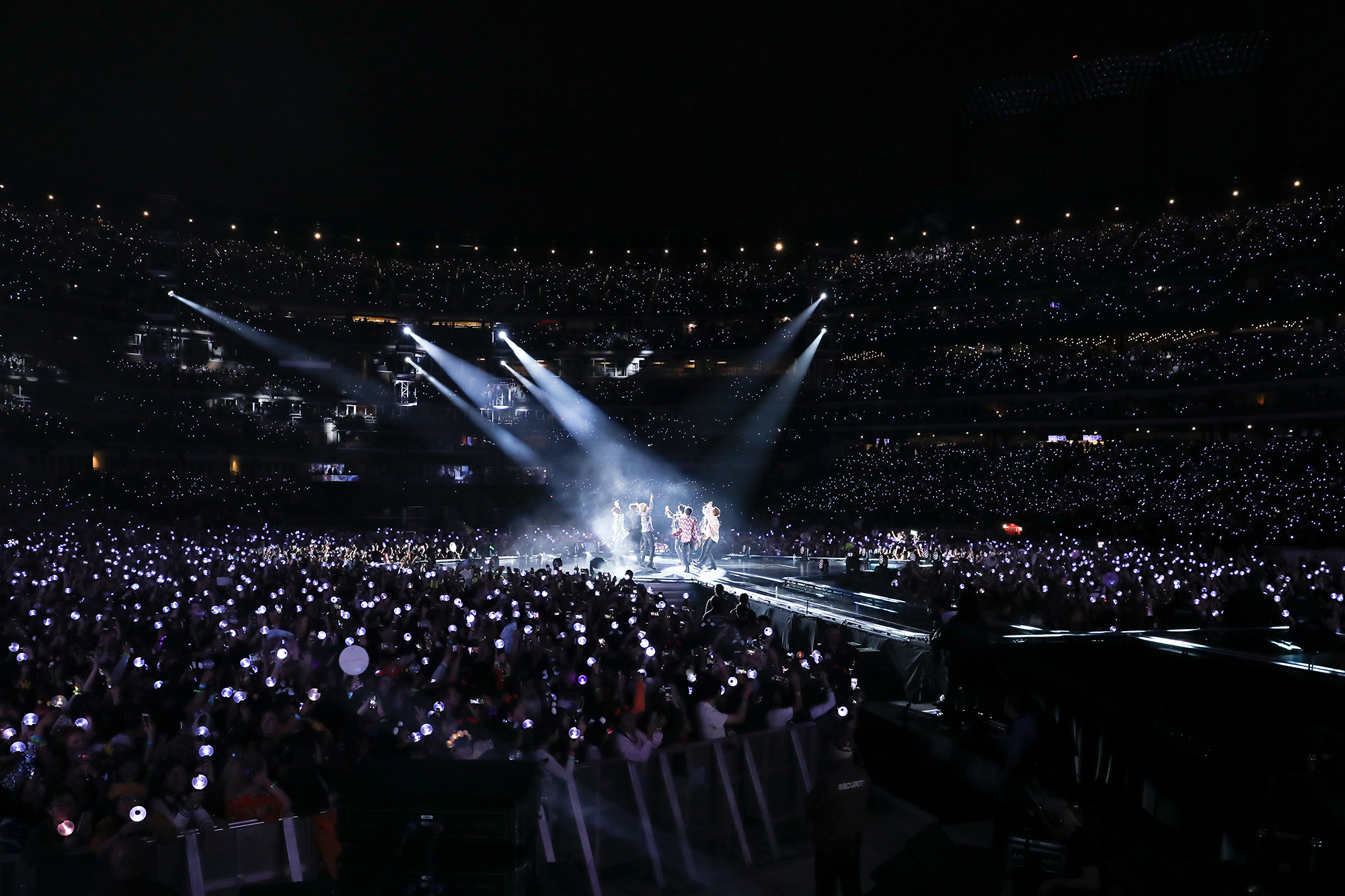[Oct] K-pop fandom receiving mixed reviews
Date Sep 30, 2021
 BTS performs at its Love Yourself concert, held at Citi Field in New York, Oct. 6, 2018. Courtesy of Big Hit Music
BTS performs at its Love Yourself concert, held at Citi Field in New York, Oct. 6, 2018. Courtesy of Big Hit Music
●Collective actions by K-pop fans have become a must for idol groups eyeing global success.
●K-pop fan-driven collective actions are facing a backlash in some countries.
Loyal fans have played a huge role in the rise to stardom of nearly every major pop celebrity.
But for K-pop idol groups, who have grown to exert huge cultural influence outside of Korea in recent years, a dedicated cohort of fans worldwide has almost become a necessity for their success as musical artists.
K-pop juggernaut BTS is no exception. The group’s fans, called “the ARMY” (an acronym for Adorable Representative M.C. for Youth), are known for strategically organizing themselves on social media to propel the septet upward on global charts through tactics like buying physical albums in bulk and collectively streaming certain tracks or singles simultaneously to boost their rankings.
Thanks to such efforts, BTS continues to set multiple new musical records as a K-pop act, including its first ever Grammy nomination, six music videos garnering more than a billion views and a series of Billboard 100-topping tracks in less than a year – “Dynamite,” “Life Goes On,” “Permission to Dance” and “Butter.”
In an interview with Billboard magazine in August, BTS’s leader and rapper RM attributed the septet’s success to the ARMY’s “high fan loyalty” and their coordinated efforts.
Sometimes the collective actions of K-pop fans have expanded beyond the entertainment realm, becoming a tool representing certain political voices. In Thailand last year, fans of the biggest K-pop groups, including BTS, EXO and Blackpink (whose member Lisa is Thai), joined forces to mobilize pro-democracy actions and organized fundraising campaigns to support the street protests.
Fans in the United States made headlines when they utilized their social media prowess to show support for the Black Lives Matter movement – high jacking white supremacist hashtags such as "WhiteLivesMatter" by flooding them with K-pop content to render them ineffective – and to disrupt a re-election campaign rally by now-former President Donald Trump.
But the collective action that defines K-pop fandom isn’t always welcome, especially in countries that view it as a potential threat to their culture.
In a statement released on August 27, the Cyberspace Administration of China announced that the organization would start implementing firm measures to deal with “disorderly fandoms” in accordance with entertainment sector regulations, which extend to K-pop devotees in China.
Just a few days later, Chinese social media platform Weibo suspended more than 20 K-pop fan accounts for exhibiting what it defined as “the irrational behavior of worshipping and supporting stars.” Some experts view Beijing’s move as an attempt to curb the potential political threat posed by collective actions from K-pop fans.
In several Islamic nations, K-pop’s explicit lyrics and revealing stage outfits have been perceived by some as having a negative influence on young, impressionable Muslim fans.
This has even led musicians in Malaysia to localize the genre by producing Muslim-friendly versions of K-pop lyrics that adhere to Islamic principles.
Last year, Rabithah, one of the groups belonging to the Kuala Lumpur-based pop label, Tarbiah Sentap Records, released cover versions of Blackpink's "Ice Cream" and “Kill This Love” in Malay. The videos have garnered more than 350,000 and 450,000 views on YouTube, respectively.
Both tracks changed “explicit and inappropriate” phrases in the original lyrics to those about love and dedication to God.
**If you have any questions about this article, feel free to contact us at kocis@korea.kr.**

The Ministry of Culture, Sports and Tourism's "Korea Here & Now" work can be used under the condition of "Public Nuri Type 1 (Source Indication)."




